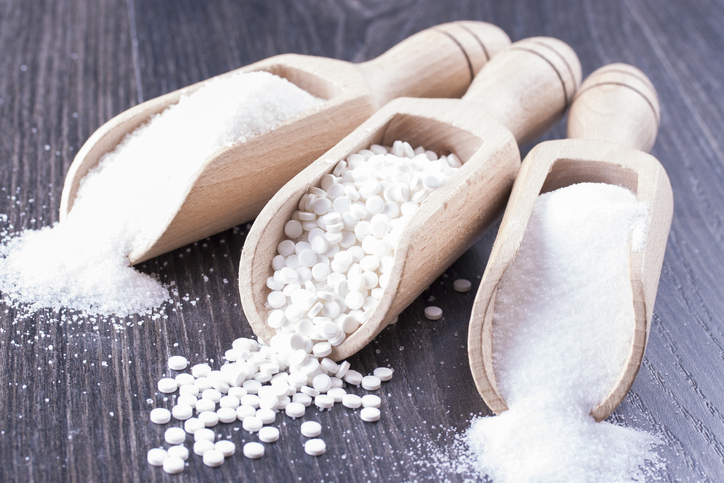By Felicia Nwosu
The Joint Food and Agriculture Organisation, a World Health Organization (WHO) Expert Committee on Food Additives, has evaluated the levels of exposure to food additives that could pose a health risk and found that there was no convincing evidence for harm with aspartame consumption below the current Acceptable Daily Intake (ADI) limit of 40 milligrammes per kilogramme of body weight.
Dr. Francesco Branca, WHO Director of the Department of Nutrition and Food Safety,
explained that an adult weighing around 150 pounds would “need to consume more than 9–14 cans per day to exceed the acceptable daily intake, assuming no other intake from other food sources.
explained that an adult weighing around 150 pounds would “need to consume more than 9–14 cans per day to exceed the acceptable daily intake, assuming no other intake from other food sources.
“The assessments of aspartame have indicated that, while safety is not a major concern at the doses which are commonly used, potential effects have been described that need to be investigated by more and better studies.”
WHO, however, warned against the excessive use of the content. It emphasized the need for consumers to consume the content in relation to the consumer’s body weight to encourage acceptable intake.
Meanwhile, to ensure the total safety and well-being of consumers, the International Agency for Research on Cancer (IARC), categorized ‘aspartame as carcinogenic. The concerned global health body expressed worry that carcinogenic is an indication that aspartame has the potential to cause cancer in humans.
Meanwhile, to ensure the total safety and well-being of consumers, the International Agency for Research on Cancer (IARC), categorized ‘aspartame as carcinogenic. The concerned global health body expressed worry that carcinogenic is an indication that aspartame has the potential to cause cancer in humans.
The IARC specifically found that the consumption of this artificial sweetener in beverages was associated with an increased risk of a type of liver cancer called hepatocellular carcinoma, according to a report by Scientific American.
The acting head of the IARC Monographs programme, Mary Schubauer-Berigan, noted that the scientific evidence pointed to the carcinogenic nature of the sweetening agent and not the risk of developing the terminal illness at a specific exposure level.
IARC further revealed that aspartame is an artificial non-saccharide sweetener 200 times sweeter than sucrose and is commonly used as a sugar substitute in foods and beverages.
Also, the American Beverage Association has stated that there was no need to alter the acceptable daily intake a “”strong conclusion,” adding, With more than 40 years of science and this definitive conclusion from the WHO, consumers can move forward with confidence that aspartame is a safe choice, especially for people looking to reduce sugar and calories in their diets.
There’s clearly a concerted effort to assuage any consumer fears around aspartame, with the American Beverage Association promoting a “Safety of Aspartame” website that pops up as a sponsored search result.The two biggest beverage companies were also quick to spread the news to minimize any potential negative impact on brand perception, mostly acting unfazed.
The Coca-Cola Company echoed the American Beverage Association’s statement about findings that “approve aspartame’s safety.” The company went on to make clear that it is “not planning to change our recipes containing this ingredient,” and will “continue to focus” on its mission of providing a range of beverage options to consumers.
The Coca-Cola Company echoed the American Beverage Association’s statement about findings that “approve aspartame’s safety.” The company went on to make clear that it is “not planning to change our recipes containing this ingredient,” and will “continue to focus” on its mission of providing a range of beverage options to consumers.
“We do not have any plans to change the product portfolio relative to where we are right now with aspartame, Hugh Johnston, PepsiCo Chief Financial Officer while speaking during the time of WHO’s announcement. Johnston explained that aspartame was only used in “a few products” in its portfolio, and was not “a huge part” of its offerings, while leaving open the possibility they could revisit a change at some point in the future.
By far the weight of the scientific evidence suggests that aspartame is safe as an ingredient, and obviously has the benefit of being zero calorie.” “Aspartame is one sweetener. There are lots of different sweeteners we use and it is relatively easy for us to shift sweeteners if it became something that was important to do,”
He reaffirmed that Pepsi had actually tried to move away from aspartame in the past. Johnson opined that the company changed its formula for Diet Pepsi to remove aspartame back in 2015, but reverted back to aspartame the following year. For upstart competitors offering alternative low or no-sugar beverage options to consumers, meanwhile, the news presents opportunity.
Dan Buckstaff, CMO for data insights and technology company said” when it comes to
sweeteners, one of the powerful trends consumers see in beverages is alternative sweeteners derived from natural sources, which many emerging brands have ridden to gain shelf space and gain momentum with consumers.”
Dan Buckstaff, CMO for data insights and technology company said” when it comes to
sweeteners, one of the powerful trends consumers see in beverages is alternative sweeteners derived from natural sources, which many emerging brands have ridden to gain shelf space and gain momentum with consumers.”






Comment
No comments found.